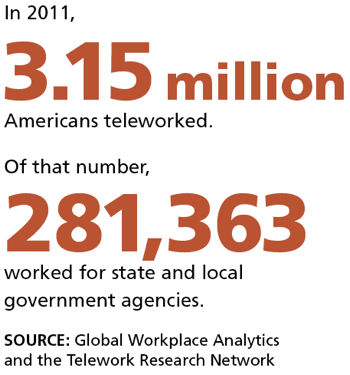Windows To Go–Powered USB Drives Enable Secure Telework for Fairfax County Workers
On any given workday, more than 200,000 vehicles travel portions of the I-495 corridor, making the commute for residents of the Washington, D.C., metropolitan area one of the nation's worst.
Traffic is, in fact, the main reason that IT leaders in Fairfax County, Va., opted to give Windows To Go a spin as part of its operating system transition. According to Director of Platform Technology Jeff Porter, about 20 percent of county employees telework at least part of the time. By embracing mobile technologies, the agency can "provide government services without clocks, walls or boundaries," he explains.
"We're still able to serve citizens, whether our employees are in the office or not."
Windows To Go, a new feature in Microsoft Windows 8 Enterprise, allows the county's IT department to provision full versions of the OS, applications, security tools and policies onto USB 3.0 drives and then distribute those drives to employees who work remotely, improving productivity and reducing the number of employee-owned PCs that IT must support. There's nothing to install or configure. Employees simply plug the drives into their Windows 7– or Windows 8–compatible PCs or other devices, connect to the county network via a virtual private network, and work anytime, anywhere.
So far, the county has distributed 150 of its 700 Windows To Go drives to teleworkers who have their own PCs at home. It will soon circulate 200 more to contractors who require regular network access and eventually roll them out to every employee.
"We look at these as computers on USB sticks," Porter says of the Windows To Go–equipped drives. "As soon as the employee plugs the drive into a host computer, it boots up and the employee can get right to work."
In addition to supporting an aggressive telework program, Windows To Go enables Fairfax County to continue operating during emergencies such as snowstorms, which would normally force government closures. "We're still able to serve citizens, whether our employees are in the office or not." That's important, he adds, "because government never stops."

The Windows To Go drives are as easy to manage as they are to use, Porter says. Any security patch or update (anti-virus, system or application) is automatically performed through the Microsoft Systems Center Configuration Manager when an employee logs in. If an offsite worker encounters a problem, Porter and his colleagues can take control of the machine remotely.
Better still, Windows To Go saves the county hundreds of dollars per employee. "Instead of paying $700 to $800 per computer, we're getting the whole stack on a USB stick for $200," Porter continues. "The savings is even more when you consider that some employees have both a computer on their desk and a laptop."
Fairfax County Addresses Data Safety Concerns
Like Fairfax County, the state of Delaware is licensed to use Windows To Go. Jim Sills, cabinet secretary for the Delaware Department of Technology and Information and the state's CIO, and his team are evaluating the technology, but their concerns about security so far have outweighed the need for a solution that aligns with state teleworker and remote worker initiatives.
"I can see the need to use Windows To Go out in the field, for employees who are using laptops and want to use other types of devices in order to access their information," Sills says. "But we are so security conscious, and there are concerns about people walking around with flash drives that are basically their desktop images."
Fairfax County addresses that issue by provisioning its Windows To Go drives with Microsoft BitLocker Drive Encryption, which encrypts computer hard drives and removable drives to protect against data theft and exposure on lost or stolen devices. In order to use the drive, a county employee has to know the user name and password, as well as provide a randomly generated password from a two-factor authentication token that the county uses. That way, if the drive is lost or stolen, it can be disabled, Porter says.
The decision to support mobile workers — and in particular those who want to use their own devices — is becoming less of a choice, Porter adds. "Consumerization is here," he says. As such, his job is to make sure Fairfax County employees can get their jobs done — even if that means using a tablet from home.
Is Windows 8 a Good Fit for Government?
Fairfax County, Va., leads not only in Windows To Go implementation, but also in Windows 8 Enterprise adoption. Jeff Porter, director of platform technology for the county, believes the technologies work hand in hand to help the county achieve its IT goals.
"We have employees coming to work with multiple devices and a lot of teleworkers. We're trying to get all those devices down to one, and Windows 8 and Windows To Go are helping" with that effort, he says. "We've realized that we have to stop worrying about the hardware and focus on the data — and always work to mitigate the risks."
Although Fairfax County has embraced Windows 8, other state and local agencies have been more reluctant to make the transition. Rob Enderle, president and principal analyst of the Enderle Group, says the live tiles and emphasis on touch represent a monumental shift in how Windows works, and thus, make many users wary.
"We don't like change, especially when something works," Enderle says, "and we don't want to muck it up once we're locked down. It can take a while for a new operating system to take hold. Often, users have to be driven out" before they'll adapt, he adds.
That's been the case for the state of Delaware, which has deployed Windows 8 in a few agencies — mainly to replace older PCs.
"People aren't yet interested in moving," says Jim Sills, cabinet secretary for the Delaware Department of Technology and Information and the state's CIO. "Our users are waiting to see if Microsoft comes out with an updated version of Windows 8 that would look more like the version with which they are comfortable."









